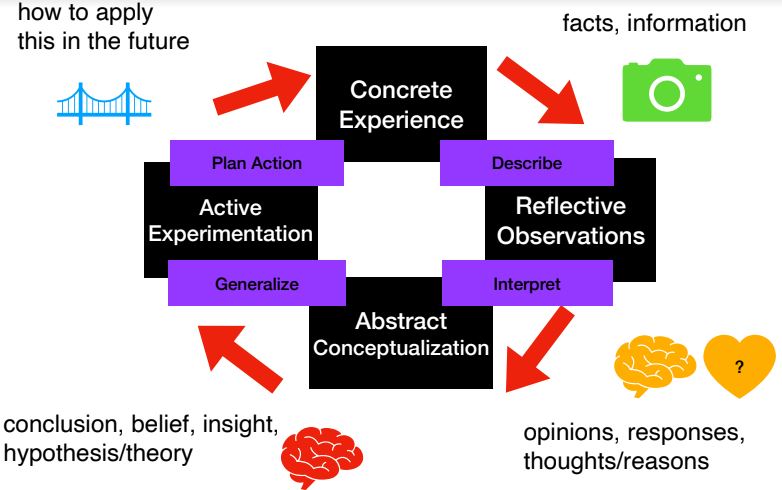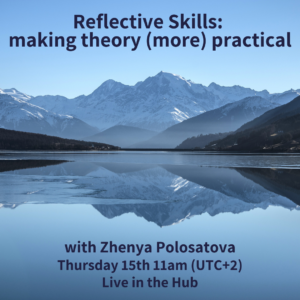We were really lucky to be joined by Zhenya Polosatova for this webinar as she’s passionate about the topic of reflective practice and teacher development. In fact, she even has a mantra on her blog: inspired teachers inspire learners.
This was the third time which Zhenya has presented about reflective practice recently and you can read more about all three sessions on her blog:
- Appreciating and Practicing Reflection for the IATEFL TTEdSIG
- Practicing Reflective Practice for ELTWorkshop
- Reflection: Making Theory (More) Practical in the Hub
Zhenya started by asking some key questions about how we currently reflect and mentioned how reflective practice has affected her own work as a trainer, a teacher and a materials writer. Some participants mentioned blogging as well as recording their classes and reading the transcript as ways of reflecting on their practice. There was also a suggestion of thinking about one aspect of the lesson, such as TTT, which can help you to focus your reflection. Later in the session, someone mentioned the idea of giving each lesson a score and then working out your average for the day – this can help you to see more balance if one particularly bad lesson has knocked your confidence. Another suggestion was to add notes to your plan as the lesson progresses and one participant mentioned having specific sections on their plan for ‘what went well’ and ‘what I’d do differently’.
We chatted very briefly about how reflection is a big part of most pre-service qualifications, but that we often stop doing it so well when we start teaching full-time.
After sharing a wonderful anecdote about her experience trail running and ways she reflected afterwards, many other participants commented on how “‘failure’ moments are an opportunity to grow and learn if we take the time to reflect” and “mistakes are learning opportunities”.
Zhenya has kindly shared her slides from the presentation, so you can see the experiential learning cycles which she refers to. Below is one of the more popular and Zhenya also shared Gibbs’ reflective cycle, which encourages a reflective moment on our feelings as well as an analysis of what happened and how well it worked. On the CertTESOL course at Active Language, trainees do bullet point reflections immediately after the class and then have time to reflect more deeply later and we talked about how when you reflect can have an impact on what you see. Zhenya raised the point that expressing feelings in feedback can be a culturally sensitive issue and that as trainers we need space and time to help our teachers to develop their reflective skills.

Another reflective tool which Zhenya shared was Farrell’s framework, which is less of a cycle but more areas to consider when reflecting. He also suggested dialogic reflection – a critical friend – who can offer another viewpoint. As Zhenya mentiones, Farrell has shared lots of his resources through his website, Reflective Inquiry, so if you’re interested in learning more, check it out. There were some other great resources mentioned in the comments:
- A Handbook of Reflective and Experiential Learning (Moon, 2004)
- Reflective Practice in ESL Teacher Development Groups (Farrell, 2013)
Zhenya is a huge fan of reflective practice groups, which is a way of not only sharing your reflections on your own teaching, but stealing ideas from your peers as they describe what happened in their lesson as part of the process. There was then a lovely group reflective practice process in the world of art, with the idea that people take on different roles in their assessment of a piece of art in the same way that different people can approach reflection on a lesson in different ways.

There was another lovely comment in the chat: “cycles and systems are there to guide us when we are new to reflection. The more we practise reflection, the more we start finding our own different ways”. And Zhenya shared a fantastic variety of tools we can use to help us reflect (on the left).
Here are some more incredible resource which Zhenya shared at the end of the presentation:
- Learning from interactive reflection – slides from Anderson’s 2021 talk at IATEFL
- Faneslow on the iTDi website
- Recharge Your Teaching (Luth, 2020)
- The Art of Reflective Teaching (Rodgers, 2020)
So many things to think about and reflect on from the webinar. As always, we like to include some questions for you to think about:
- How easy will it be to build reflective practice into a part of your schedule?
- Which of the tools Zhenya proposes would you be most interested in trying?
- Would you be interested in a reflective practice group facilitated by the Hub? Let us know!
